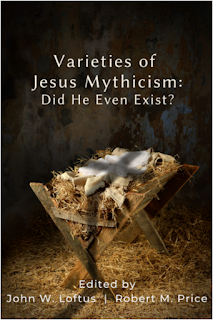One way to do this, if you really want to know, is to assume what you currently believe is false. That is step #1. Step #2 is to demand the sort of evidence that a judge would allow in court. Step #3 is to produce that evidence or give up what you currently believe. No excuses. No double standards.
There are exceptions, like disputes over beauty, or other subjective preferences, but the exceptions cannot be the rule.
An apologist asked me this question:
"Do you think that if a creator created us that we should be accountable in some way to this creator?" My answer:
No. If a creator exists we have no obligation to him if we are given metaphysically free self-determination. He can impose such a thing on us, but that's something he should negotiate with us. God has no right to command us to do good without providing good reasons for being good. And if those reasons are indeed good ones we should be able to discover them without him having to command them.
No one should be above the law, not even the lawmaker. That's why a kingship model of God in the Bible is offensive, as found in the story of Job, since kings could do whatever they could get away with doing. If a god exists he must be subject to his own laws. "Thou shall not kill, lie or steal" as they apply. By contrast the social contract is a negotiated one. Democracy is a participatory type of government.
If a creator god wants to be praised or thanked he should earn it. Now of course, we would give praise to him and thank him for life. But we should only praise and thank such a god as his creation is a good one, and his deeds in the world are good ones.
Below is Appendix C from my book, Unapologetic: Why Philosophy of Religion Must End (Pitchstone Publishing, 2015), pp. 257-271. You're welcome! Given the influence of Alvin Plantinga and William Lane Craig, I doubt very much believers have heard these issues discussed like this before. I share it in hopes you'll like what I write enough to read the whole book.
The Demon, Matrix, Material World,
and Dream Possibilities,
by John W. Loftus
On Thursday, August 11th, baseball fans will watch as the Chicago Cubs take on the Cincinnati Reds in the second installment of the Field of Dreams event at 7:15 p.m. ET on FOX. It will be played in Dyersville Iowa, located in Dubuque County. My great grandfather Tom Loftus was a lifelong resident of Dubuque, and was buried there.
John Pregler is a baseball historian who has written about my great grandfather Tom Loftus. Tom was a Major League Baseball player, manager, co-owner with Albert Spalding of the Chicago Cubs (Orphans), and one of three men who founded the American League (with life long friend Charles Comiskey, and Ban Johnson).
Pregler sent me a message recently, saying: "I'll be thinking of Tom Loftus this Thursday (8/11). One of seven men to manage both the Reds and the Cubs, and the only man to manage in 4 different major leagues. And he is buried 24 miles from the Field of Dreams. Both teams will drive by his cemetery and would be able to see his grave, if they knew he was there, rooting them both on. I've tried in vain to get MLB and FOX Sports to recognize this fact, but crickets."
I responded, "A movie script should be written about this."
Guest Essay Written by Cat_Lord:
1.
Introduction
Throughout the course of Christian
history, there have been many and various attempts to argue for the truth of
Christianity. In this post, I will
discuss one popular form of apologetic argumentation named presuppositionalism.
The main points I want to write about are what this apologetic is as it relates to Cornelius Van Til, its
relationship to what are called “transcendental
arguments” in the philosophical literature, give examples of how presuppositionalists
often proceed with their argumentation, and finally point out some problems
with this apologetic.
Bill Craig answers questions on his website Reasonable Faith. This one was published on October 31, 2011: Q #237 "Is Appeal to the Witness of the Holy Spirit Question-Begging?"
The following is the text of a portion of their 1999 Ohio State University debate on the question “Did Jesus of Nazareth Rise from the Dead?” the audio of which was published on October 17, 2013, https://www.youtube.com/watch?v=I1vaqsnhgJY. This text was published as an Appendix in my book, Unapologetic: Why Philosophy of Religion Must End.
William Lane Craig has admitted from the very beginning of his writing career that the historical evidence for the resurrection is not the basis for the Christian faith. Historical investigation into the evidence itself is not the reason for knowing, or for showing, Jesus arose from the dead. By extention, evidence itself is not the reason for knowing, or for showing Christianity is true. This makes Craig's whole apologetic work a sham. For saving sinners is all up to his god to do. Craig's god does not need apologetics to get that job done. Evidence is not needed. Historical research is not needed. Craig is not needed. Only belief is needed (unto salvation) and it does not have to be reasonable faith(!) based on sufficient evidence.
If this is true one might say, "No wonder there isn't enough evidence to accept the Christian faith!" Or, conversely, "Apologetics is logically fallacious empty rhetoric without substance." Craig's apologetics may be used by his god to convert sinners, but his god doesn't need apologetics to do this. His god already has an alleged inspired book of writings and the alleged spirit of the trinity to convert people. Since conversion is god's task, Craig's entire work ends up being written for believers who are already converted to strengthen their faith. But then it always has been that way. Anselm said it best, so let me translate what he said: "Faith seeks evidence"; "Faith seeks reason"; "Faith seeks data."
One must consider what could be the case, but is acknowledged by Craig that it isn't the case. What if there were sufficient evidence for Christianity? What then? Well, then Craig would not have to make excuses in advance for the fact that the evidence is insufficient to rationally accept the Christian faith. That's what! He's admitting the evidence is lacking, in advance, even before he presents it with all the research he can muster.
The following text comes from Craig's book The Son Rises: The Historical Evidence for the Resurrection of Jesus (Chicago: Moody Press, 1981; reprint, Eugene, OR: Wipf and Stock, 2000): pp. 7–8.














.jpg)







